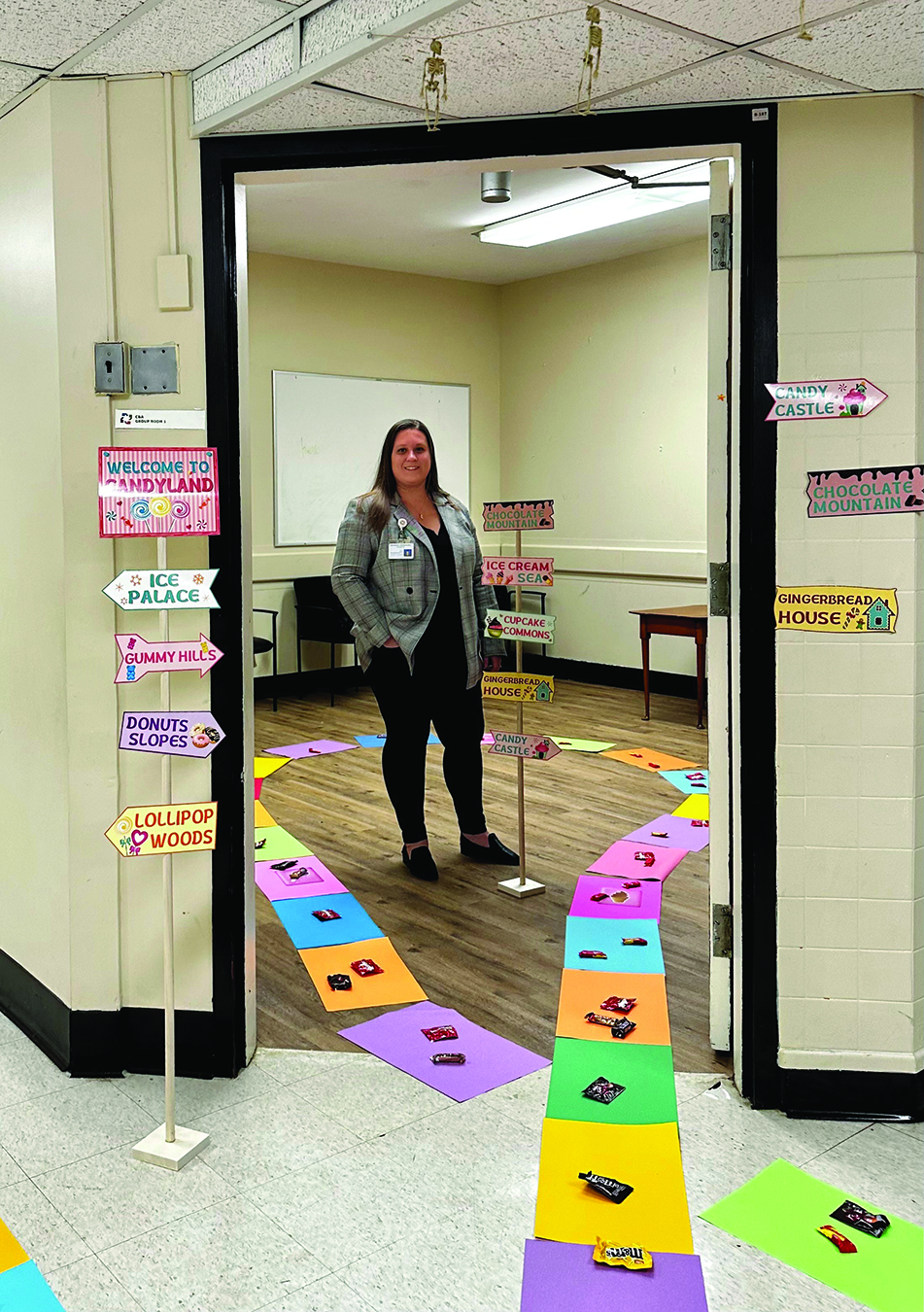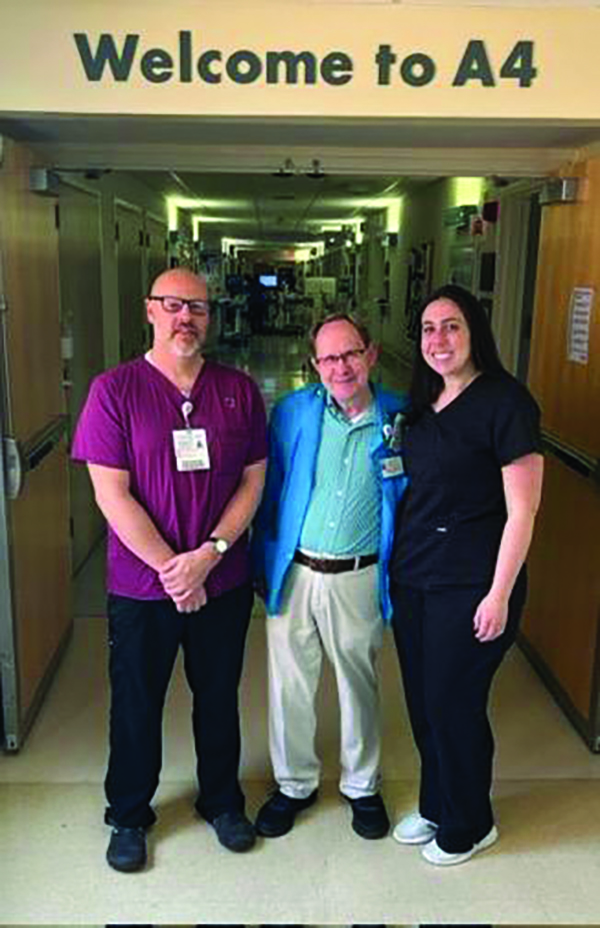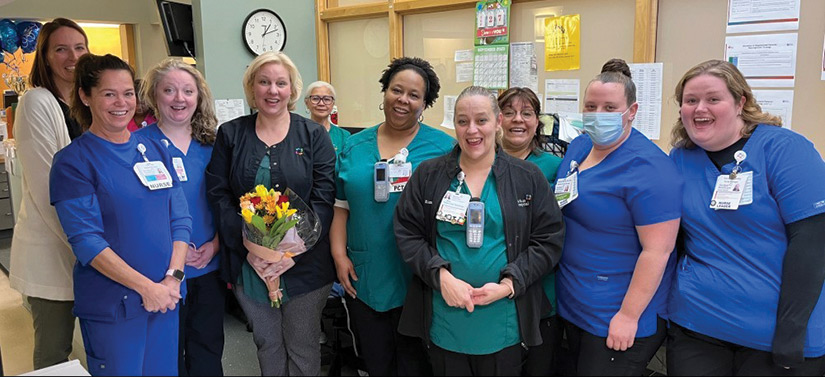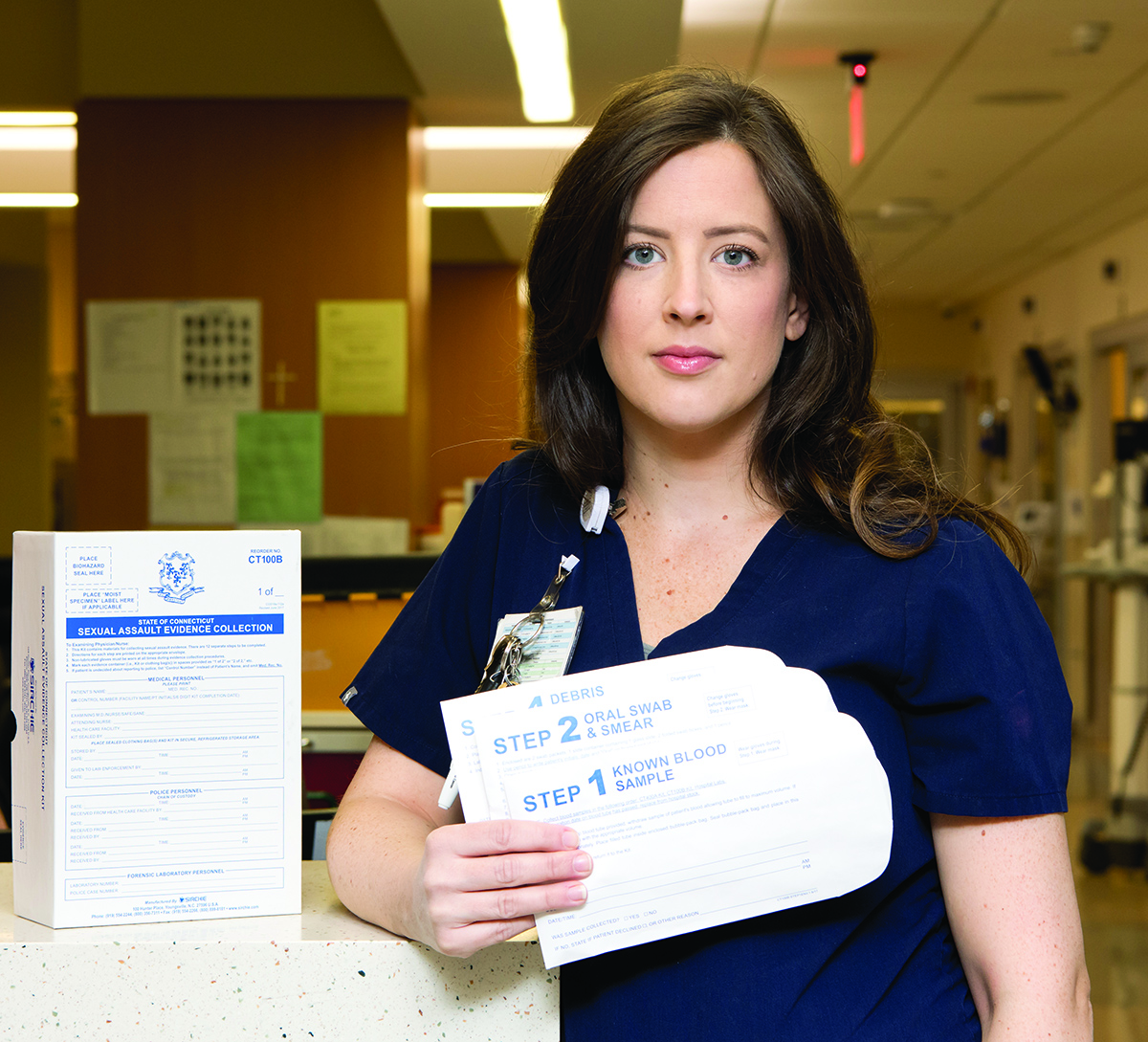Every day, our colleagues do amazing things to benefit patients and the community.
Email your moments that matter to susan.mcdonald@hhchealth.org.
Candyland Takes on New Meaning in Therapy
By Susan McDonald
They don’t play games when it comes to therapy for adolescent clients at Rushford, or do they?
Allie Juchniewicz, a social worker with Rushford Adolescent Services who earlier last year developed a dialectical behavior therapy (DBT) track for group sessions, tapped her creativity to engage clients with a life-size version of the board game Candyland.
“In any therapeutic program, client engagement is important to keep adolescents returning to sessions and remain actively engaged in their treatment,” Juchniewicz says.
“This life-size Candyland demonstrates that therapy does not have to be just group discussions or worksheets, but it can be fun and inviting.”
These are clients with severe symptoms of emotional dysregulation, who struggle to manage their emotions and behavior. They often need emergency help and/or a hospital stay.
The Rushford DBT track, she says, teaches these adolescents the skills needed for better self-control, significantly reducing safety concerns, preventing hospitalizations, increasing use of coping skills and improving their quality of life.
DBT skills adolescents learn through each track cycle. To play, pairs of players spin the Candyland wheel and move to the appropriate color. Each color prompts them to answer questions about emotion regulation, distress tolerance, managing interpersonal issues and safety planning, allowing them to consider how to use their skills when they feel unsafe and determine available support like emergency hotline numbers.
The game also offers easy exercise prompts that gets players moving, notes Javonna Davis, clinical program manager. As teams move through the life-size board, they collect candy. Winners earn gift cards.
“Given the intense nature of the program, it’s important to keep adolescents interested, motivated and engaged in treatment by getting creative, while also allowing them to practice the skills they are learning in the program, Juchniewicz says.
Many clients have been through multiple types of therapy and feel hopeless about participating in more, but she explains that when group sessions involve teamwork, play, real-life scenarios, games and peer led discussions, they’re more likely to engage and feel motivated to work on their issues.
“This life-size Candyland demonstrates that therapy does not have to be just group discussions or worksheets, but it can be fun and inviting, allowing skills that are taught to be retained and easier to use in their everyday lives,” she says.

Mobility is Medicine
By Libby Marino

Every day, Danny Taylor experiences the reward of being a Backus Hospital volunteer, a retirement pursuit driven by his passion for helping others.
“I’ve helped so many families over the years. Every so often, I run into one that will say they remember me when I helped their loved one,” says Taylor, who started in 1987 as an x-ray aid. “One man said he remembered how I cared for his wife and provided comfort when she had cancer. It’s the little things that go a long way and make a difference.”
Taylor worked in the imaging department for 10 years before becoming a patient care technician (PCT).
“After a decade, I decided to go back to school. Once I graduated, I pursued a career on A4 (an inpatient unit at Backus),” says Taylor, who took courses in dementia, PCT and to be a certified nursing assistant.
He retired in 2018, but returned to Backus a week later as a volunteer. He drew on his 25 years as a PCT and his compassion for others to lead the hospital’s Volunteer Mobility Program.
“Some people don’t want to move. They feel life isn’t worth living or it’s too hard to get up. That’s what we’re here for. We help push and motivate them little by little, one lap at a time,” Taylor adds.
The Volunteer Mobility Program, a collaboration among Volunteer & Guest Services, nursing and rehab colleagues, launched on one patient unit and later expanded to two more.
“They identify patients who may benefit from assistance with mobilization and exercise. Danny works with the clinical team to identify the safest plan, helps patients prepare for ambulation and ambulates them throughout the unit,” says Carley Warzecha, manager of workforce development and volunteer services.
This program runs weekdays, helping 30 or more patients per week.
“Because of this program, patients will walk anywhere from 15 to 30 minutes a day. We try and encourage them and remind them the more they do – the better chance they have of going home,” Taylor says.
Spending time in a hospital can be lonely, and the program also gives patients important socialization.
“The volunteers are not sharing test results, good news or bad news with them. They aren’t running tests or taking vitals. This provides an opportunity to connect on a personal level and the patients really appreciate and look forward to it,” Warzecha says.
Mooney Earns System’s First Heart Failure Designation

Megan Mooney, heart failure program coordinator at Backus Hospital, was the first at Hartford HealthCare and one of two in Connecticut to earn heart failure certification through the Heart Failure Society of America.
This certification recognizes providers with demonstrated advanced knowledge and skill.
Preserving Evidence, Healing Hearts
By Robin Stanley
One in three women will experience physical violence, rape and/or stalking by an intimate partner in their lifetime.
One in 10 men will experience intimate partner violence in their lifetime.
Last year, 21 people were killed in domestic violence incidents in Connecticut.
Many victims of abuse never get the closure they deserve. At Hartford HealthCare, a special subset of colleagues is doing everything they can to bring perpetrators to justice.
Jill McTighe was only 18 months into her career as an emergency nurse at St. Vincent’s Medical Center when a woman arrived requesting a “rape kit.”
“I was still very new to nursing and I didn’t know how to use the evidence collection kit,” she recalls. “I knew I wanted to do a good job for people who had experienced such a traumatic event.”
The experience led McTighe to seek training to become Sexual Assault Forensic Examiner (SAFE) certified. The certification is not easy, involving lengthy clinical and classroom training, on top of her full-time job.
“The training was a big part of my life at the time but there was a desire to serve others,” she says.
All emergency room nurses can use evidence collection kits, but SAFE training helps ensure the integrity, preservation and documentation of forensic evidence. Evidence that is properly collected can help convict perpetrators in court.
The evidence collection kit is a time-consuming 12-step process with every detail documented by hand.
“Depending on the severity of injuries, it can take anywhere from three hours up to eight hours,” McTighe says. “You cannot leave the evidence at any point.”
Preserving the integrity of the evidence is crucial. It could be thrown out of court if collected incorrectly. For McTighe and other SAFE nurses, this means no bathroom breaks or stepping out for a bite to eat until the police come to collect the kit.
This dedication and compassionate care helps SAFE provide closure for victims.
“The process can be very challenging and almost revisiting the entire event for the victims,” she says. “But it can also be rewarding because you can give the victim hope and the ability to look past the event to a point where they can start to heal from it.”

SAFE by the numbers
The number of SAFE-trained (Sexual Assault Forensic Examiner) nurses in HHC emergency departments:
- Hartford Hospital: 2
- Charlotte Hungerford Hospital: 3
- Backus Hospital: 3 full-time, 3 per diem
- Plainfield Emergency Department: 1
- Windham Hospital: 2
- MidState Medical Center: 2
- St. Vincent’s Medical Center: 4
